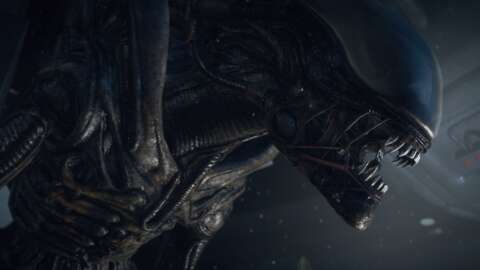There’s something specific about Ridley Scott’s 1979 movie Alien that makes it such an enduring classic. With the combination of its heavy focus on relatable, blue-collar characters, its dingy, lived-in capitalist version of space travel, and its stalking, unknowably malevolent creature, it creates a feeling that other horror movies have chased and tried to replicate again and again across the decades since its release.
The latest attempt to recapture what made Alien so viscerally, singularly frightening is Alien: Romulus, a sequel to that original movie. It does a better job than some of the Alien canon of at least creating scary moments with the universe’s greatest killing machine, but it relies on explosive, bombastic moments with H.R. Geiger’s xenomorph, much like the rest of the series’ sequels.
It’s a solid-enough movie, but it’s not frightening in the same way that Alien is frightening. Facehuggers burst from hiding and scramble over each other as they chase their prey, while xenomorphs clamber after the humans, hissing and bearing teeth, making sure to get right in the faces of the heroes as many times as possible. And at key moments, Romulus does what most of the Alien movies and games have done in the years since the original was released: It turns the creatures into cannon fodder to be blown away by machine guns.
Alien: Romulus tries to capture what makes the xenomorph frightening up close, but it ends up just mugging for the camera a few times.
There’s really only one Alien sequel that captures the essential feeling of the original film, and that sequel isn’t a movie, but a video game. Alien: Isolation isn’t a perfect Alien story, but it focuses on doing one thing incredibly well: bringing the alien to life and making it absolutely terrifying.
With Alien: Isolation, the focus is on moment-to-moment encounters with the creature. The game turns the final intense scenes of the original film–in which Ripley creeps around a corner, flamethrower in hand, sees the creature, and then carefully sneaks away–into the whole of the experience. It’s great at this; you creep around the locales of Sevastopol station, all inspired heavily by the actual sets and concept drawings of the original film, with a single huge, unstoppable alien sneaking around in vents and stomping around corridors, searching for you.
Most of the time in Alien: Isolation, your only means of dealing with the creature is to give it the slip, by hiding in a locker or ducking under a table, or carefully listening for and navigating around it as it does its best to find you. Every once in a while, though, the thing will sniff you out. In these moments, a gout of fire from your flamethrower might be enough to save you, and it might not.
If nothing else, Alien: Isolation gets the idea of just how dangerous the alien is. It’s an intelligent hunter, using everything at its disposal to find and kill you. It will sometimes stalk around the halls looking for you, but it’ll also spend its time squeezed into vents, listening and setting traps, waiting for you to stumble under an open gap so it can rip you off your feet and into darkness. Nothing can kill the alien in Isolation, and trying to shoot or fight it is mostly just an invitation for it to murder you. That makes encountering other survivors even more frightening, because if they start shooting at you, it’s likely they’ll get everyone killed.
Knowing that you can only ever delay the inevitable against a huge and unstoppable alien makes Alien: Isolation terrifying.
You spend most of your time alone in Alien: Isolation, just you and the alien, hoping that you’re out of sight or that the improvised noisemaker you just threw will be enough to distract it so you can slip away. When it isn’t hunting you, Isolation’s story tracks through the usual beats of an Alien story, with various characters screwing each other over for their own gain only to get their comeuppance when the creature comes calling, and those elements of the game are serviceable, but not especially exciting.
What Alien: Isolation creates exceedingly well, however, are those heart-pounding moments when the creature is right there and you’re hoping you can hold your breath long enough that it won’t hear you.
It’s this feeling that every Alien movie after the original has failed to really capture. Aliens comes close–the moment in which the Colonial Marines are decimated pulls on this thread, with Hudson screaming, “They’re coming out of the walls!” hitting on the idea that what’s really frightening about the alien is their comfort in the shadows and their stalker’s intelligence. Alien 3 attempts to capture this same vibe but struggles to provide interesting, relatable characters for the alien to chomp on. Both the prequels, Prometheus and Alien: Covenant, take the idea of a scary creature and go all-out with it, with monsters that scramble toward victims and barrel through fields to bite off heads. These movies focus on the chaos of their monsters, rather than the cold, ordered precision of the xenomorph as originally conceived.
And then there’s Alien: Romulus, which excels at a lot of the things Alien: Isolation is also good at. It recaptures the essence of Alien’s original set design and retro-future setting, creating the same dark, industrial kinds of locations that look both lived in and upsettingly uncomfortable for human beings–while being entirely too comfortable for something like the alien. Romulus understands the look of Alien and is great at resurrecting the feel of the movie.
Alien: Romulus and Alien: Isolation share some incredible art direction and set design that perfectly capture the world of Alien and make it unsettling and beautiful.
But Romulus can’t quite get the monsters right. It does a good job of making the facehugger more frightening as it turns it from a lurking, surprising ambusher into a fast, scuttling menace, but it does the same to the xenomorph itself. In Romulus, apart from one half-hearted attempt to use a character as bait for the others, the alien displays little interest in lying in ambush ro relying on intelligence and surprise, searching for ways to surprise the humans and ultimately carry them off to be unwilling incubators for its young. The creatures are never shadowy, instead banking on being big, slimy, and menacing.
Alien: Isolation also has the alien stomping around loudly and then charging straight at its prey, to be sure. But the difference is that, in Isolation, the creature is nigh unstoppable in addition to being smart and agile. The fact that you see it walking around actively looking for you makes it more frightening. In Romulus, though, seeing so much of the alien takes some of the bloom off the rose. Romulus’s creatures are not especially huge, not especially smart, and not especially unstoppable, as the movie demonstrates toward the end when several xenos get cut down easily by Pulse Rifle fire. At that point, the most lethal thing about them becomes the splashing of their acid blood and guts on space station walls.
The other Alien movies are fine in their own way, each adding something different to the conversation, and that includes Alien: Romulus. Even though I’m on record as being lukewarm on the new film, it was still a pretty good time; Aliens is among my favorite movies ever, and I have some kind of love, respect, or at least awkward fascination with Alien 3, Alien: Resurrection, Prometheus, and Alien: Covenant.
Alien: Isolation knows that the feeling of these scenes from Alien is the true terror at the heart of the franchise.
But while all of them have their own unique additions to the franchise, none of them has what Alien had–that creature, waiting amid the machinery to descend on a shocked Brett or hiding in the cramped darkness to ambush Dallas or tearing apart an overmatched Parker to get to a terrified Lambert. I’m still waiting for a movie to recapture that same monster: the one that has haunted my dreams since I first saw Alien. But at least I know that creature is waiting for me in the decrepit confines of Sevastopol whenever I boot up my PC and Alien: Isolation.

